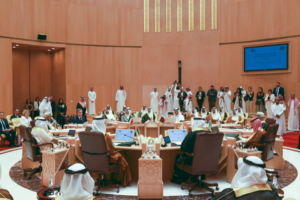As Secretary of State Antony Blinken set off for Saudi Arabia on June 6, 2023, the second high-level U.S. official to visit the Kingdom in a month, the State Department issued a lengthy fact sheet extolling eight decades of U.S.-Saudi relations.
That the Biden administration felt compelled to remind the world exactly what had bound the two countries for so long reflected a counterfactual: growing strains between a hydrocarbon fuel-sufficient democracy and an authoritarian monarchy that is the primary gas station for other countries, especially U.S. rival China.
The trip came at a time of shifting dynamics in a Middle East that perceives a U.S. retrenchment, even as members of the Gulf Cooperation Council (GCC) and Israel continue to rely on U.S. weapons and military personnel, primarily to deter Iran. In response, the region is pursuing multi-alignment with other partners. These trends come as the U.S. enters a new presidential election season eager to avoid major crises in a part of the world that has often been the source of turmoil and U.S. military intervention for more than four decades.
To examine these trends and identify both opportunities and potential perils for U.S. policymakers over the next 18 months, the Stimson Center’s Middle East Voices and Reimagining U.S. Grand Strategy programs convened a day-long symposium of more than a dozen regional experts. The participants, several of whom agreed to be quoted by name, focused on potential shocks that could result in U.S. military action and how the U.S. might adapt to new regional dynamics. They also looked at China’s rising role and whether that might translate into a more active and constructive posture beyond midwifing a recent agreement between Iran and Saudi Arabia to normalize relations.
China’s Role
China’s profile in the Middle East has been growing for more than a decade and took a major leap in 2016, when President Xi Jinping traveled to the region and concluded multiple strategic partnership agreements, noted the Stimson Center’s Jesse Marks. The Chinese benefited from erratic U.S. policies under the Trump administration and also used “vaccine diplomacy” to great effect during the Covid crisis, providing inexpensive Sinovac shots to countries including Jordan and Iran. A U.S. non-response to rocket attacks on the Saudi oil facility at Abqaiq in 2019 marked an inflection point in Saudi/GCC perceptions of U.S. reliability. In addition, strains with the Biden administration and Congress over the Saudi killing of U.S.-based journalist Jamal Khashoggi in 2018 and other Saudi human rights abuses and what was seen as an incompetent U.S. withdrawal from Afghanistan in 2021 contributed to unhappiness with Washington in Riyadh and other regional capitals. The United Arab Emirates also objected to the lack of a firm U.S. response to attacks by Iranian-backed Houthi rebels in Yemen and Iran’s recent seizure of oil tankers.
Participants saw China’s growing partnership with the region as significant but not yet a strategic shift away from dominance by a U.S.-organized coalition. James Jeffrey, a former U.S. diplomat now chair of the Middle East Program at the Woodrow Wilson Center, noted that the U.S. still has 30-40,000 troops based in 10 Arab countries, Israel, and Turkey, provides nearly $10 billion in mostly military aid annually and sells some $150 billion in weapons, which require U.S. maintenance, spare parts, and training. However, Kristin Diwan of the Arab Gulf States Institute in Washington said the U.S. is not perceived as injecting stability in the region and that Arab countries see “an alternative global order” in which they are not obliged to follow U.S. dictates. “There is a sense of happiness and rediscovery of agency in the Middle East because the U.S. left and is not playing such a role in deciding who is in charge,” said Trita Parsi of the Quincy Institute. “The U.S. focus is on Ukraine and Taiwan, allowing the space for [Middle East] détente.”
Participants pointed to potential opportunities in China’s growing profile in terms of preventing conflict. For example, the fact that China is the major purchaser of Iranian oil is a disincentive to Iran ever carrying out its repeated threats to close the Strait of Hormuz to tanker traffic. China is also likely to urge Iran not to cross the line and build nuclear weapons out of fear that could trigger a military confrontation which would also imperil oil shipments and threaten the global economy. In addition, China is concerned that Iran’s eventual acquisition of nuclear weapons might inspire similar actions in East Asia. Should a crisis loom, several participants suggested, the Arab League could request Chinese intervention and point out the big discrepancy between the interests of China, a major oil importer, and Russia, which would benefit from a war in the Persian Gulf and skyrocketing oil prices.
India’s ambiguous role as major actor
There was a robust discussion about India as a potential significant geo-strategic player in this now more dynamic region. India’s long economic ties to the Persian Gulf region were noted, but the consensus view was that New Delhi would continue its all-azimuth foreign policy and not support any major U.S. initiative to construct an anti-Iran coalition as a central feature of the Abraham Accords. As noted by a number of participants, the Chinese brokered détente between Saudi Arabia and Iran, as well as Israel’s recent dramatic rightward political shift, appear to have reduced the scope and momentum of this diplomatic enterprise even as the Biden administration pledges to pursue Saudi-Israeli normalization. Furthermore, New Delhi will continue to hedge its geostrategic bets by sustaining its military industrial relations with Russia and engaging in the Quad, as part of the U.S.-led effort to contain China’s military rise.
Preventing a nuclear crisis with Iran
Concern that Iran would weaponize its growing stockpiles of highly enriched uranium was seen as the major near-term threat to regional stability. Both the U.S. and Israel have vowed not to let Iran develop nuclear weapons and the Biden administration has said that it would use military force as a last resort.
Ali Vaez of the International Crisis Group saw potential to avert crisis not through revival of the moribund 2015 Joint Comprehensive Plan of Action (JCPOA) but an interim fix of “restraint for restraint.” Iran would not enrich uranium to weapons grade and would increase cooperation with the International Atomic Energy Agency in return for unfreezing some of the billions of its oil revenues frozen in foreign banks and the Europeans not snapping back U.N. Security Council sanctions. (The release of $7 billion in South Korea has been mentioned, sometimes in the context of nuclear de-escalation, sometimes as a potential concession for Iranian release of U.S. hostages.)
Ironically, as Vaez noted, the one thing that could incentivize Iran to weaponize would be a pre-emptive strike against its nuclear facilities by Israel or the U.S. Thus a good formula for restraint would be that Iran stops short of weaponization and Israel refrains from overt or covert attacks on Iran’s nuclear infrastructure and personnel.
Syria as a flashpoint for conflict
Even if a nuclear crisis with Iran is averted, however, many participants noted the chances for regional conflict arising out of the fact that Syria has become the venue of choice for tactical strikes by Israel and the U.S. against Iran-backed forces and vice-versa. “Syria can blow up at any time,” Jeffrey said. Even though the U.S. has only a few hundred troops in Syria — nominally there to prevent the resurgence of the Islamic State group — “Iran sees the U.S. presence [in Syria] as a real problem,” Jeffrey said. U.S. and Iranian-backed forces have engaged in tit-for-tat strikes and Iran has reportedly stockpiled improvised explosive devices to threaten the Americans.
Despite U.S. objections, the regime of Syrian President Bashar al-Assad has just been readmitted to the Arab League, but his country remains devastated after years of civil strife, including Assad’s use of chemical weapons against his own people and Russian air strikes on the regime’s behalf. Randa Slim of the Middle East Institute said any substantial Arab investment in Syria reconstruction should depend on good treatment for refugees. Despite widespread regional concern about Iranian influence, Slim said the “Iranian network [of proxies] has peaked” and that each of Iran’s proxies was facing substantial internal challenges over poor economic performance and bad governance. “They run a failed state, a destroyed state and another on its way to becoming a failed state,” she said of Lebanon, Syria, and Iraq, respectively. “They broke it and they own it.” [Iran is also facing its own economic woes and crisis of legitimacy after the death in police custody of Mahsa Amini in September 2022.] Slim pointed approvingly to the Saudi decision to invest in Iraq to help that country diversify its sources of income. China is also investing in Iraq. But any investment in Syria, she said, should come with strings.
De-dollarization is not yet a real phenomenon, but sanctions need review
As the U.S. has turned increasingly to economic sanctions to contain countries such as Iran and Russia, both the targets of the sanctions and their trading partners have increasingly sought workarounds, effectively developing new barter arrangements. However, the dominance of the U.S. dollar as the world’s main financial reserve is not yet in question. “Countries are looking for alternatives to U.S. dollar but are struggling to find alternatives,” noted Rachel Ziemba of the Center for a New American Security.
Current discomfort with a U.S. dollar-centric financial order in much of the Global South is reflected in Chinese actions to develop an alternative and a push by the BRICS (Brazil, Russia, India, China, South Africa), which Iran seeks to join, and Saudi interest in joining the BRICS “New Development Bank.” But the lack of convertibility of the Chinese RMB due to Beijing’s capital controls suggests that there is no viable alternative to the dollar for the foreseeable future.
Despite the dollar’s continued strength, the heavy use of sanctions is delivering diminishing returns, participants said. Ziemba said the U.S. Treasury should build on recent exemptions for humanitarian assistance following earthquakes in Turkey and Syria. When announcing new sanctions, humanitarian exemptions should be underlined at the same time. None of the participants advocated lifting sanctions on Syria, however, without sustained evidence that Assad would not mistreat returning refugees.
Need to clarify U.S. positions
There was a consensus that the Biden administration needs to clarify its positions, stop appearing like a bystander, and adapt U.S. policies to changing regional realities. Participants noted discrepancies in the way the Iran threat is defined by Central Command and the National Security Council, for example. They also said there is a need to recognize growing agency in the Arab world as an opportunity not a threat to U.S. interests. Iran-Saudi détente is a positive development, and Arabs need to take the lead on pressing Iran to live up to its commitments, such as stopping weapons shipments to the Houthis, said David Ottaway of the Wilson Center.
Participants also saw value in extending the Abraham Accords to countries such as Saudi Arabia. They pointed out that the pact has not succeeded in containing Iran as some of its architects had originally hoped but can be used to deepen regional economic cooperation and persuade Israel to improve the lot of the Palestinians.
“Detente really is the right word for what is happening regionally,” said Nathan Brown of George Washington University. “It used to be that diplomacy really wasn’t present in Middle East politics and that has changed. We are seeing normalized relations develop between the countries. It’s a fundamentally healthy thing. It means the U.S. role is diminishing but that’s a healthy thing.”




